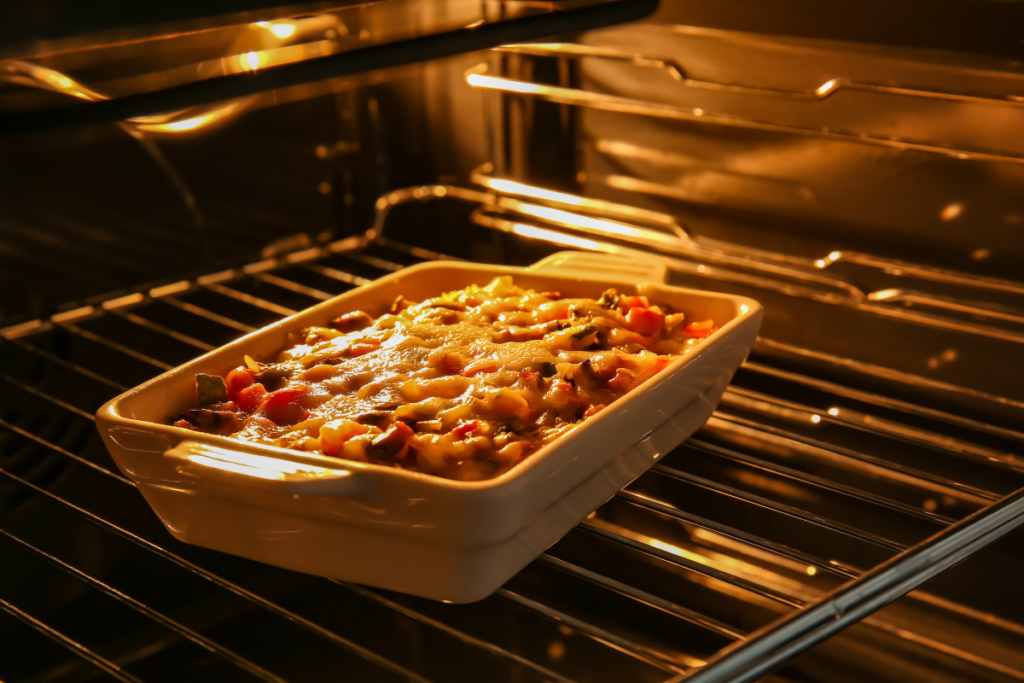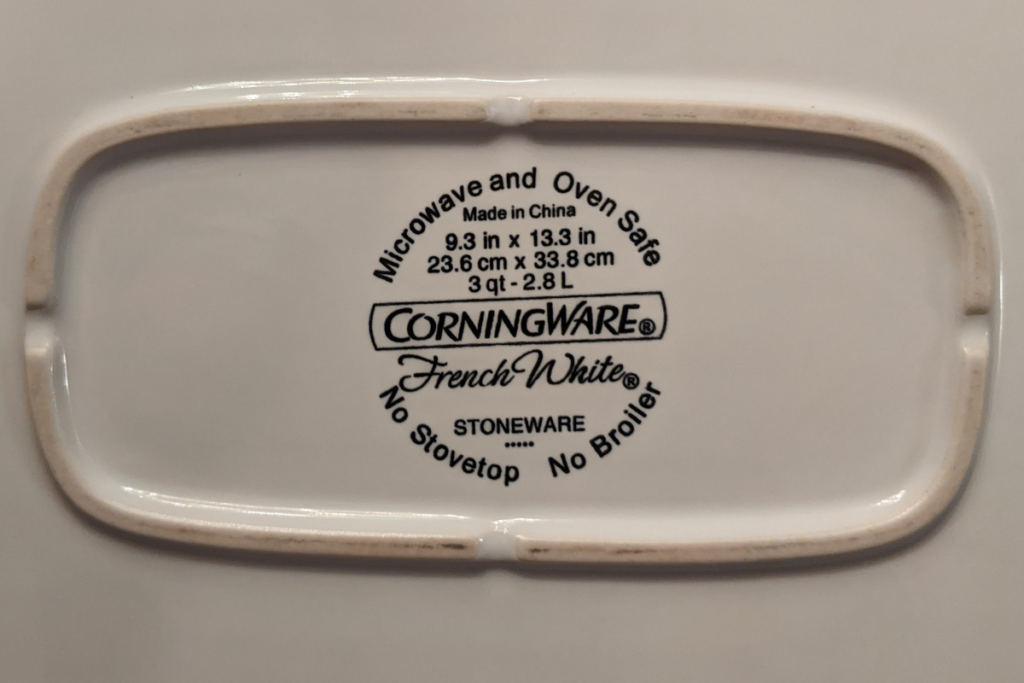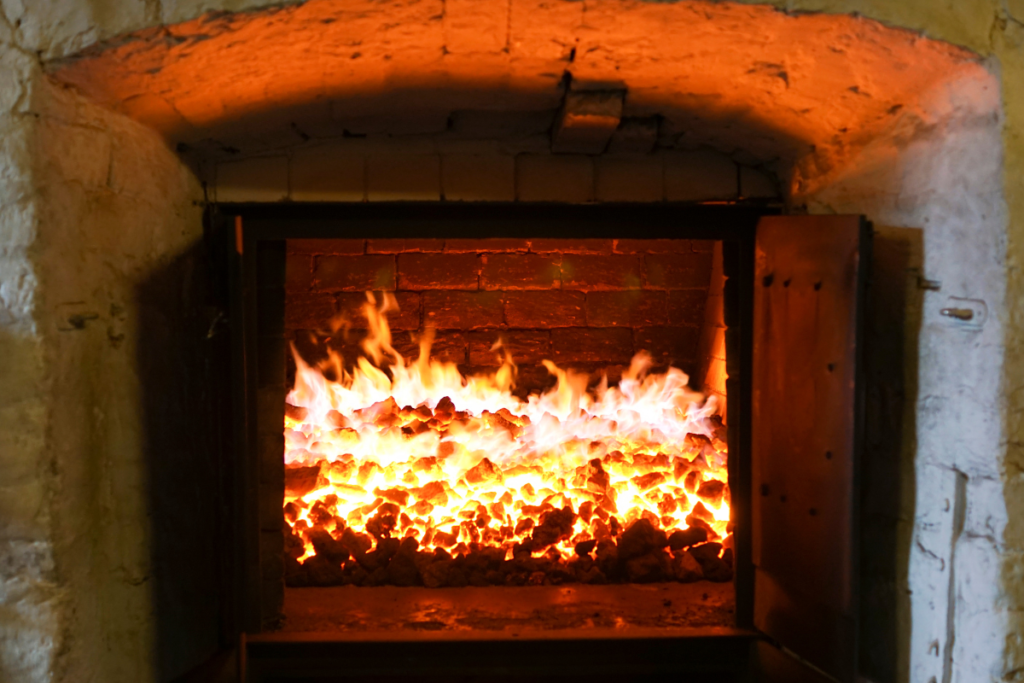Are Stoneware Dishes Oven Safe? (How Hot Is Too Hot?)
Stoneware is a popular type of ceramic and is used to make serving dishes, plates, bowls, and even cooking and baking dishes. With the material being so prevalent in the kitchen, you’ve probably looked at your stoneware serving dishes and asked yourself, “are stoneware dishes oven safe?”
Most stoneware is oven safe and can withstand even the high temperatures used when baking or cooking in a conventional oven. However, not all stoneware can be heated to the same temperatures and it’s best to consult with the manufacturer’s directions. Stoneware is typically not stovetop or broiler safe.
Keep reading for a full explanation of what stoneware is and how to tell if yours is – or isn’t – oven safe. I’ve also included a comparison of stoneware versus porcelain and ceramic cooking ware.
Are stoneware dishes oven safe?
Stoneware is a popular material for both professional and home kitchen dishes due to its ability to move easily between hot and cold, its heat retention, and its resistance to absorbing flavors. These are go-to serving dishes, but are they oven safe?
Most stoneware is oven safe and can withstand the high temperatures ovens produce. However, it would be best to consult the temperature limit of your specific stoneware brand before putting it in an oven. Not all of them can take high temperatures.
In fact, some stoneware items can only withstand temperatures up to 350°F.
“Stoneware” has also become something of a generic marketing term. Some items may be marketed using “stone,” but are not made of the same materials or treated under the same intense conditions as true stoneware.
What temperature is safe for stoneware
By now, you know already that stoneware can withstand high temperatures. However, it still has limits as to the level of heat that it can take.
Stoneware can safely heat up to a temperature of 450°F (232°C).

Most home ovens can reach 500-550°F, but typical recipes call for temperatures closer to 350-425°F.
Some reviews have stated that some customers have used their stoneware at a temperature of up to 475°F and that their stoneware is still in good shape. At that point, it’s up to you to decide if you’re willing to risk your cooking ware (and dinner) on those 25 degrees.
Is stoneware broiler safe?
When cooking in an oven, the heat comes from the bottom heating element, but is applied to the food in all directions. When using the broiler, however, the entire force of that heat is bearing down directly. This is great for browning your food quickly, but not for your stoneware.
Stoneware should not be exposed to direct heat and is not broiler safe.
Oven broilers range in temperature but can be anywhere from 400-550°F.
If you do not want to have your stoneware destroyed, you should not expose it to a broiler or grilling or over a direct heat source.
Why does stoneware crack in the oven?
There are a couple of reasons your stoneware might crack in the oven, but chances are the culprit is thermal shock.
The most likely reason that stoneware will crack in the oven is that it was taken from a cold environment and placed into a hot oven too quickly. To avoid thermal shock, allow the dish to come to room temperature before placing it in the oven.
Your stoneware may also crack in the oven if it has pre-existing damage – either from old age or mishandling – that is exacerbated by the heat.
Can you bake with stoneware?
Stoneware is a great dish for baking, as it is durable and can typically withstand temperatures up to 450°F.
Stoneware’s ability to distribute heat evenly and retain heat makes it a great choice for baking, giving you an evenly baked pie.
The good thing about stoneware is it can maintain its temperature, even when removed from an oven. This ability to retain heat makes it the bakeware of choice for many.
However, it’s crucial to keep an eye out for sudden temperature changes when using an oven. Keep in mind that such a change can cause your dish to crack.
A Handy Tip – Preheat your microwave oven with the stoneware inside. Also, it shouldn’t be empty.
Benefits of baking with stoneware
A stoneware dish is ideal for baking as it gives you a perfect result.
Some of the benefits of baking with stoneware are:
- Even heating and cooking – Stoneware heats evenly and distributes that heat evenly to your dish. This means no part of your yummy bread, pie, or cake is left behind.
- Heat retention – Heat retention is vital to a crisp crust.
- Non-porous – Even if you used your favorite stoneware baking dish to make fish pie last week, your cheesecake won’t taste fishy at all.
How to tell if stoneware is oven safe
We cannot overemphasize the benefits of knowing if a dish is oven-safe before using it for this purpose. These dishes come in various price points. But the fact that you got them with your hard-earned money should make you take proper care of your dishes.

Here are simple ways to determine if your dish is oven-safe or not to avoid damaging your dish or oven itself.
- Consider brand reputation – This may sound out of place, but it’s true. Many brands have a reputation for producing quality items consistently. If you’re trying to find out if a brand is oven safe, you should be able to simply check the bottom of the item in question.
- Check the bottom of the dish – Look underneath the dish. Many manufacturers included a stamped or embossed symbol to indicate the item is oven safe.
- Look up manufacturer instructions – If you don’t see a stamp stating if a dish is oven safe or not, don’t try to use it without confirming. Most manufacturers have that information easily available on their website, although you will likely need to know the year that it was produced.
- Glazing is a factor – If you find “glazed” on a dish, chances are it’s not meant to be used in the oven. While the stoneware itself may be able to handle the heat, the glaze will crack.
Is glazed stoneware oven safe
Glazed stoneware is often used for decorative pieces and dinnerware.
Glazed stoneware is not oven safe and should not be exposed to extreme temperatures.
Additionally, certain glazes can be a safety hazard because they can leach metals into the food, harbor bacteria, or become a physical contaminant if chipped.
Enamel dishes are made of stainless steel and coated with ceramic. Are they oven safe?
Is Threshold stoneware oven safe
Threshold is Target’s in-house everyday kitchen and dining brand. It offers basics including dinnerware sets, serving dishes, and bakeware sets, including this 3 piece set.
Threshold’s stoneware bakeware is oven safe up to 450°F.
It’s safe to assume that all the bakeware items are oven safe, and all available items seem to have the same heat rating, although some reviewers have indicated some pans are prone to cracking at temperatures above 350°F.
Is Ikea stoneware oven safe
Ikea specializes in supplying affordable furnishings, but it sells minimal versions of most everyday household items – and some truly amazing meatballs – including stoneware.
Ikea’s stoneware baking, cooking, and serving dishes are oven safe up to 536°F. While the brand does offer stoneware tableware, those items are safe for the dishwasher and microwave, but not the oven.
If you’re unsure if your Ikea stoneware is oven safe, check the website for specific information. For example, the Vardagen 13” pie plate is purported to withstand temperatures up to 536°F.
Is Mainstays stoneware oven safe
Mainstays is Walmart’s in-house houseware brand, offering towels, pillows, decorations, and cookware.
Most Mainstays stoneware includes plates, bowls, and mugs which are not oven safe. However, a select few stoneware serving bowls are oven safe to 400°F.
Walmart’s bakeware offerings tend to be nonstick metal pans rather than stoneware.
Difference between earthenware, stoneware, and porcelain
It’s not surprising to find earthenware, stoneware, and porcelain in the same kitchen. They are all forms of ceramics and all make excellent cookware.
In fact, earthenware, stoneware, and porcelain all boast similar-looking materials. It’s also easy for someone without knowledge of all three ceramics to confuse them. So what’s the difference?
The primary key to differentiating earthenware, stoneware, and porcelain lies in the temperature used:
- Earthenware – 1,112-2,192°F
- Stoneware – 2,150-2,330°F
- Porcelain – 2,192-2,642°F

In general, the higher the temperature, the more durable the item – and the more expensive.
Earthenware
Earthenware stoneware is the most economical ceramic used for baking and cooking pans.
Earthenware is fired at a lower temperature than other ceramics, 1,112-2,192°F. Unlike some other ceramics, earthenware is glazed before the second heating. This allows the dish to hold liquids, which it could not do otherwise.
Earthenware is more economical than stoneware, however, it is also more likely to chip or break and is not typically considered good for daily use.
Stoneware
As the name implies, stoneware ceramics are stone-like. They are strong, durable, and likely to last for quite a long time.
Stoneware dishes are made using extremely high temperatures: 2150-2330°F. These dishes are naturally waterproof and don’t require additional glazing.
Stoneware makes excellent bakeware and will last for many years when treated properly.
Porcelain
Of these three ceramics, porcelain is fired at the highest temperature.
Most manufacturers fire clay to get porcelain at temperatures ranging from 2,192-2,642°F. Porcelain is made using a finer particle clay meaning that it is very durable.
Porcelain can be dishwasher and oven safe, although it all comes down to the embellishment, glaze, and product process adopted.
Do not place a porcelain dish in an oven or dishwasher without consulting the manufacturer.
Is stoneware more durable than earthenware
Stoneware is more durable than earthenware. Let’s consider the temperature at which each of these ceramic products heats up.
Stoneware can handle temperatures higher than what earthenware can take. This alone should give you some clue about stoneware’s durability.
Earthenware is porous meaning it can absorb water if submerged in it for long. With stoneware, you have no fear of porosity. Stoneware is waterproof. Also, stoneware has a glass material that is added to it to give it strength.
Is stoneware more durable than porcelain
Choosing between porcelain or stoneware dinnerware is likely to come down to your budget. Both types of dinnerware are produced with high-quality materials.
Stoneware is popular, durable, and more opaque than porcelain. Stoneware is a popular choice for most restaurants because it can withstand heavy usage.
Porcelain is non-porous and durable because of the higher firing temperature that it undergoes. More so, porcelain dinnerware is classier for daily use and more formal dinners.
It’s crucial to know that stoneware is thicker and heavier than porcelain. But it doesn’t have the strength porcelain has. So you would need to take extra care when reheating food or when washing your stoneware dish.
Stoneware is safe for your oven, microwave, and dishwasher. So it is more versatile than porcelain. It is also quite difficult to crack, chip, or scratch it.
Stoneware is so resilient that you don’t have to be very careful when handling it. Since we use it every day, its resilience has become an essential factor. It is also functional for all kinds of use.
Stoneware is also pocket-friendly, which isn’t bad considering its versatility and durability.
Are stoneware dishes microwave safe?
Now that we’ve established stoneware is oven safe, can it be used in the microwave?
Most stoneware is microwave safe, although you should check with the manufacturer’s directions to be sure. In order to be safe, the glaze used must be microwave safe and formulated to ensure it doesn’t leech into the food when heated.
Older or low-quality stoneware may contain dangerous chemicals like lead and arsenic, hazardous to human health if they leach into food when microwaved.
The stoneware must also be small enough to fit inside the microwave and turn without touching the interior. If it gets stuck in one place, the heat with be distributed unevenly and can lead the breakage.
Final thoughts
Most stoneware baking items are oven safe, often up to 450°F or even higher.
If you’re unsure whether or not your stoneware is oven safe, check the bottom of the dish or the manufacturer’s directions.
Popular, well-respected brands are likely to be oven safe; handmade items should be reserved for decoration or serving room-temperature foods.
Let Us Know How We’re Doing!
Did this expertly prepared resource answer your question?
Do you have another question about home maintenance, home improvement projects, home appliance repair, or something else?
Get more information, send in questions and keep the discussion going by contacting the I’ll Just Fix It Myself company customer service team at at 1-800-928-1490 or Email us at [email protected]
